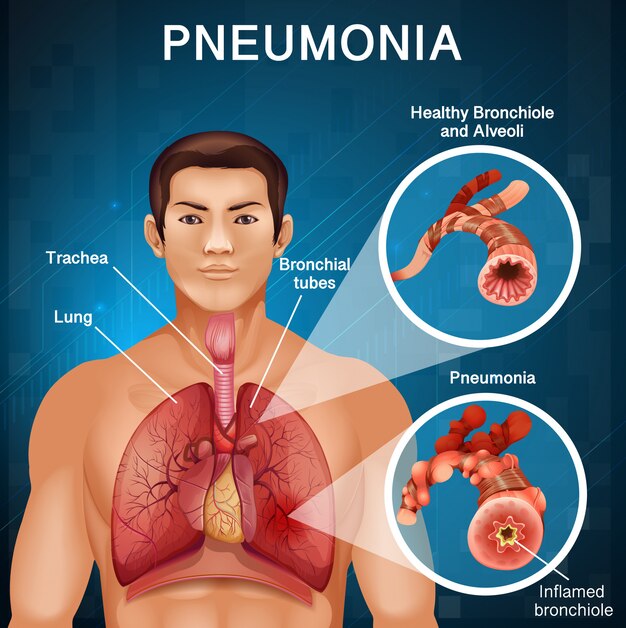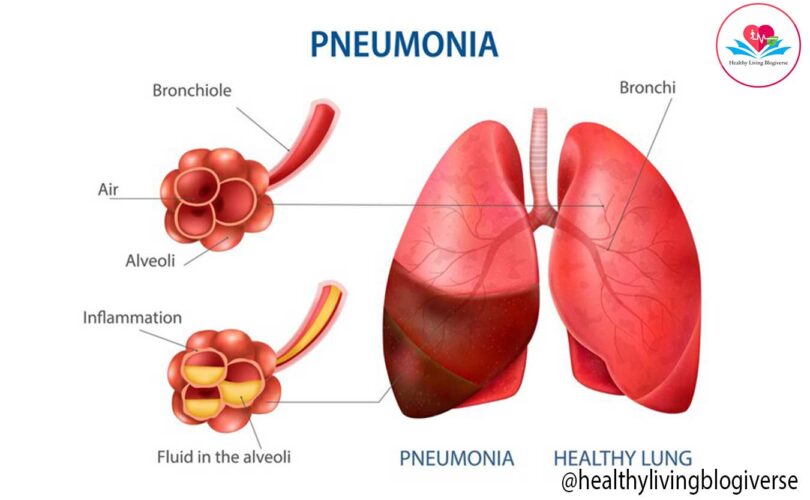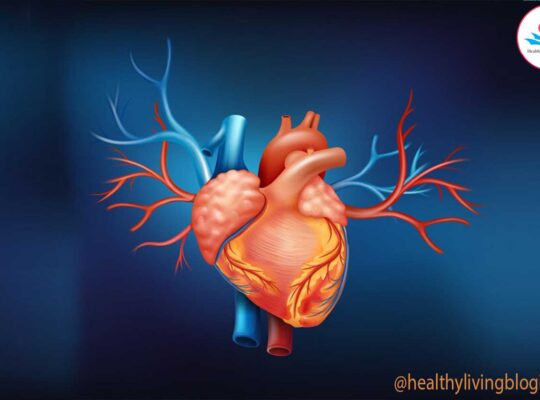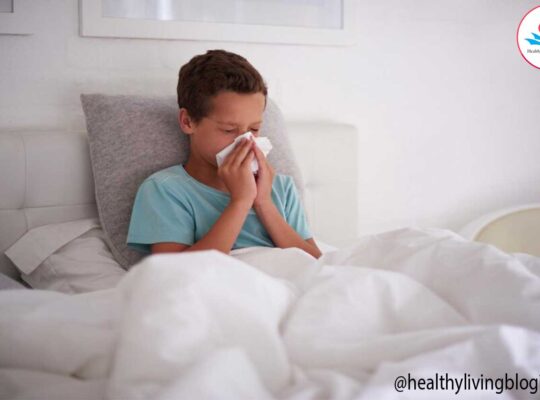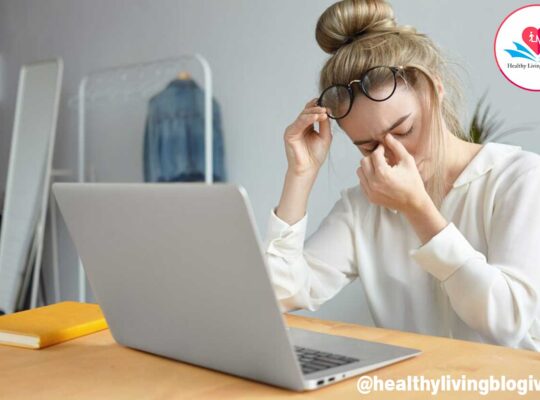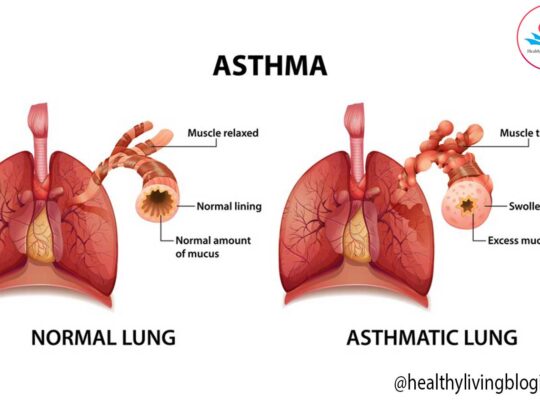Pneumonia is a lung infection that causes inflammation and fluid buildup in the air sacs of the lungs. It can be caused by various pathogens and can lead to symptoms like cough, chest pain, fever, and difficulty breathing. Treatment involves medications, rest, and supportive care. Preventive measures include good hygiene and vaccinations. Seek medical attention if pneumonia is suspected.
Symptoms of Pneumonia
Here are some of the common symptoms of pneumonia:
- Fever and chills
- Cough, often producing phlegm or mucus
- Shortness of breath or difficulty breathing
- Chest pain, especially when breathing deeply or coughing
- Fatigue and weakness
- Muscle aches and joint pain
- Sweating and shaking
- Bluish lips or nails due to lack of oxygen
- Confusion or changes in mental awareness (in older adults)
Causes of Pneumonia
Pneumonia can occur due to several reasons. Here are some of the main causes:
1. Bacterial Infection: Bacteria can enter the lungs and cause an infection. It can be acquired through respiratory droplets or by inhaling bacteria from the throat or stomach.
2. Viral Infection: Common viruses like influenza, respiratory syncytial virus (RSV), and the coronavirus (COVID-19) can infect the lungs and lead to pneumonia. Viral pneumonia often occurs as a complication of respiratory viral infections.
3. Fungal Infection: While less common, certain fungi like Pneumocystis jirovecii can cause severe pneumonia, especially in individuals with weakened immune systems.
4. Aspiration: Pneumonia can develop when inhaling food, liquids, stomach acid, or other substances into the lungs.
5. Hospital-Acquired Infections: Pneumonia can be acquired during a hospital stay, particularly among patients on mechanical ventilation. This is called hospital-acquired or nosocomial pneumonia.
6. Community-Acquired Infections: Pneumonia acquired outside of healthcare settings is called community-acquired pneumonia. It can be caused by bacteria, viruses, and, less commonly, fungi.
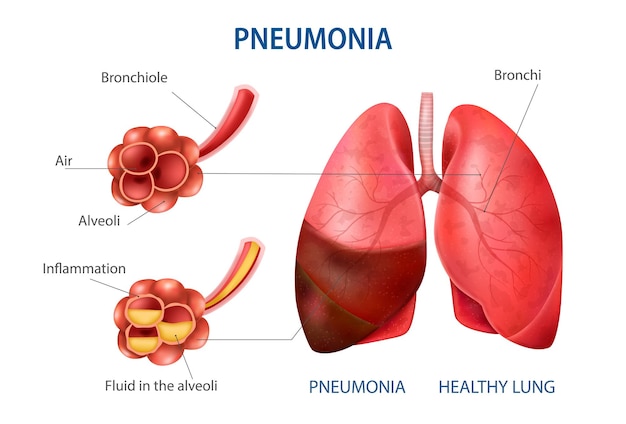 | It’s important to remember that pneumonia can have different causes, and the specific cause may vary depending on the individual. Treatment for pneumonia depends on the cause, severity, and the person’s overall health. If you have symptoms of pneumonia, it’s recommended to seek medical attention for an accurate diagnosis and appropriate treatment. |
Who is at risk of developing pneumonia?
Pneumonia can affect individuals of all ages, but certain groups are at a higher risk. The following are some categories of people who are more susceptible to pneumonia:
- Young Children: Children under the age of 5, particularly those under the age of 2, have a higher risk of developing pneumonia due to their underdeveloped immune systems.
- Elderly Adults: Older adults, especially those above the age of 65, are more vulnerable to pneumonia due to age-related changes in the immune system and underlying health conditions.
- Individuals with Chronic Diseases: People with chronic health conditions, such as asthma, chronic obstructive pulmonary disease (COPD), diabetes, heart disease, or kidney disease, are more prone to developing pneumonia.
- Smokers: Smoking damages the lungs and weakens the immune system, making smokers more susceptible to respiratory infections such as pneumonia.
- Weakened Immune System: Individuals with a weakened immune system due to HIV/AIDS, cancer, organ transplant, or certain medications (like corticosteroids or chemotherapy drugs) have a higher risk of pneumonia.
- Hospitalized Patients: People who are admitted to hospitals, particularly those in intensive care units (ICUs), are at an increased risk of developing hospital-acquired pneumonia due to exposure to different bacteria and viruses.
- People with Influenza (Flu): Influenza can lead to complications such as pneumonia, especially in people with weak immune systems or pre-existing health conditions.
It’s important to note that while these groups are at a higher risk, anyone can develop pneumonia. It’s crucial to maintain good hygiene practices, get vaccinated (including the pneumonia vaccine if recommended by your healthcare provider), and seek medical attention if you experience symptoms of pneumonia.
Pneumonia Prevention Tips:
1. Get vaccinated: Vaccines can protect against certain types of pneumonia.
2. Wash your hands: Regularly wash your hands with soap and water to prevent the spread of germs.
3. Quit smoking: Smoking increases the risk of pneumonia, so it’s best to quit or avoid secondhand smoke.
4. Stay up to date with vaccines: Keep your vaccinations, including flu shots, current to reduce the risk of pneumonia.
5. Live a healthy lifestyle: Eat well, exercise, and get enough sleep to boost your immune system.
6. Cover your mouth: Use a tissue or your elbow when coughing or sneezing to prevent spreading germs.
Remember, if you experience symptoms of pneumonia, such as a persistent cough or difficulty breathing, seek medical attention.
